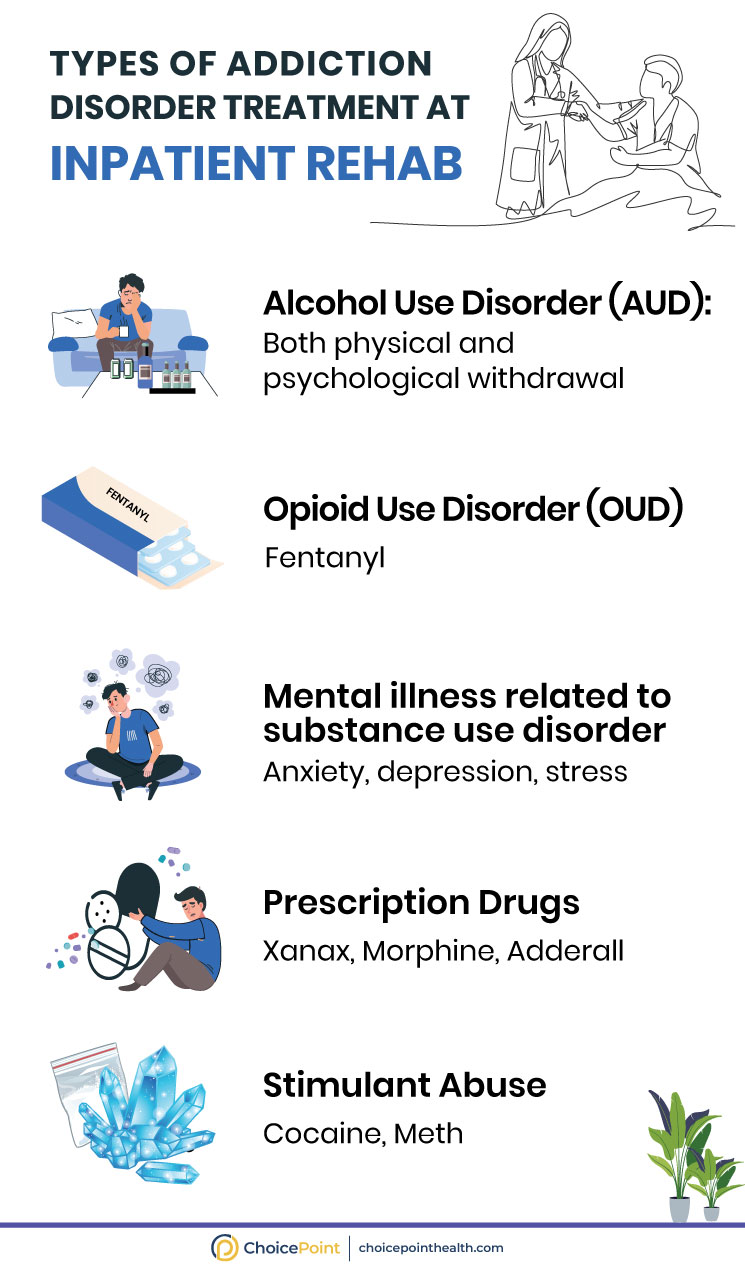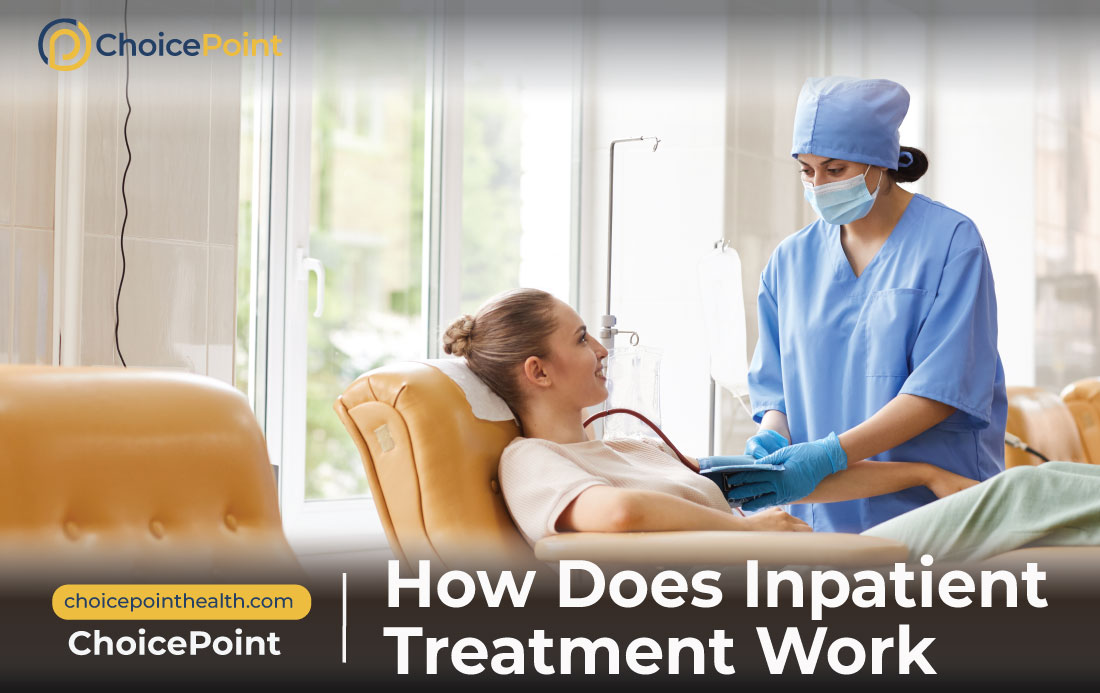Before we can discuss how does inpatient treatment work, we ought to understand why we must go for it in the first place. Despite the disruption of illegal drug supply by US Customs and Border Protection, National overdose death prediction remained at 109,940 at the start of 2023, and alcohol abuse was no less. Why is inpatient treatment necessary? Because “Every life saved means one less grieving family and community,” as described by Dr. Rahul Gupta (Director ONDCP).
Get your addiction struggle sorted out at ChoicePoint inpatient treatment center. Call 844.445.2563 to discuss how it works!
Table of Contents
What Is Inpatient Treatment
Inpatient treatment, occasionally termed residential or hospitalized, is the peak or safest form of addiction treatment for those struggling to maintain or start sobriety. It’s a live-in treatment where a person receives the highest level of structured care and medical supervision.
Inpatient stay can be varied according to a patient’s needs and condition, as it can be
- 7 days, mostly detox
- 30 days, an average stay
- 90-180 days, recommended period
During treatment, a person may need to stay isolated or with peer fellows and will be at the hands of DEA-Certified practitioners.
- Psychiatrists
- Doctors
- Nurses
- Psychologists
- Nutritionists
- Addiction Counselors
- Practitioners
Moreover, inpatient treatment can be personalized according to the type of person and need, such as veterans, students, expecting mothers, and the LGBT community.
6 Reasons Why You Need Inpatient Treatment for Drug or Alcohol Abuse?
Before we get into the details of how inpatient treatment works, Let’s ponder over the observations that should be made to check if a person immediately needs inpatient treatment:
- If daily life is impaired due to excessive substance (drugs) or alcohol misuse.
- Previous less intensive treatment didn’t work out.
- Had a relapse while trying to quit substance or alcohol misuse.
- If a person’s surrounding environment or family members are not supportive.
- Dealing with symptoms of addiction that may prove fatal, i.e., seizures, bloody vomiting, PTSD, etc.
- Suffering from co-occurring disorders, i.e., mental and addiction.
Overall, it is better to leave this decision to doctors/physicians who may evaluate a person based on certain clinical principles and procedures to provide the greatest care possible.
Are you looking to seek treatment at an inpatient facility? Give a Call 844.445.2563 to get a drug testing facility at your doorstep before you begin with ChoicePoint!
How Does Inpatient Treatment Work
What happens during inpatient treatment is based on the individual’s condition. Experts categorize and place a person based on certain judgments because addiction is a disease that requires extensive planning, rigorous healing, and substantial therapy to maintain abstinence.
Basic inpatient treatment includes three steps: Medical detox, MAT, and continued care. Let’s go through their details:
Intensive Detox Treatment for Catharsis
After admission, the first step in inpatient treatment involves the removal of toxications related to drugs and alcohol in the body fluids and cravings from the mind so that the body can be flushed before starting medication that may interfere with bodily fluids and brain mechanisms.
Moreover, starting detox without clinical guidance and observation may lead to mishandling uncomfortable situations due to withdrawal symptoms.
- Vomiting and nausea
- Tremors and trembling
- Insomnia and restlessness
- Fatigue and headache
- Breathing and heart issues
- Anxiety and depression
Every symptom can be well managed at an inpatient facility, and intervention with the medications described below may become necessary.
Medication-assisted Treatment for Withdrawal Symptoms
Ever wonder why it is necessary to consult physicians when one takes any medications? Especially in the case of drug or alcohol rehab? It is because a layman can never manage the dose or side effects or may get addicted to that medication if prolonged.
Medication-assisted treatment is an indispensable element at an inpatient facility, used in the Narcotics Act of 1974 involving specialized FDA-Approved medications needed for the effective management of
- Withdrawal symptoms
- Side effects of medication
- Cravings of drug/alcohol
- Blocks rewarding properties of substances
Stigmas associated with using medication to treat drug addiction, particularly opioids, were clarified when the National Institute of Health considered addiction a treatable disease. Which medications will be used during inpatient treatment depends on the type of substance a person has used after careful evaluation and drug testing.
Medication for Opioid Disorder
Common medications used to treat opioid use disorder are:
Medication for Alcohol Disorder
Common medications used to treat alcohol use disorder are:
- Naltrexone
- Acamprosate
- Disulfiram
Medication for Other Addictions
Other addictions may include marijuana, hallucinogens, stimulants, and sedatives. These substances need medication according to their withdrawal symptoms and severity or may involve the above medications in combination. Under pharmacological observation and guidance, this is only possible in an inpatient treatment setting.
Are you worried about your addiction medication and confused about how does inpatient treatment work? Call 844.445.2563 to learn more about the treatment options you can opt for.

What Types of Addiction Treatment are Available?
How Does Inpatient Treatment Work for Depression
Many people dealing with anxiety, depression, paranoia, PTSD, trauma, etc., get help from substance use, which worsens the situation. After detox, inpatient treatment combines MAT with certain psychotherapies to resolve these disorders by
During inpatient treatment, psychologists apply these to perform psychological detox, develop a character-building nature, and nurture a positive mindset to deal with stressful situations and improve mental health.
Relapse Preventive Plan
“As an alcoholic in recovery, I believe there is no final endpoint to addiction recovery. There is no cure for addiction, just finding equilibrium and sustaining those practices that have been successful for a person.”
Quoted by one of the top writers on Quora “Eliza Peters.” It is really important to realize the importance of preventing relapse after rehab. While under inpatient treatment, clinicians and psychologists collectively observe potential relapse signs like:
- Hiding information/secrets
- Irritable behavior
- Excessive food cravings
- Avoiding staff/ peer fellows
All of these are avoided with effective relapse prevention strategies after rehab in an inpatient treatment setting that includes:
- Coping skills, i.e., self-control
- Nutrition guide
- Exercise
- Awareness Therapy
- Teaching self-care
Such skill sets often come at the end of inpatient treatment. It carries on for a long time to ensure no hopelessness prevails, as mentioned by Eliza about not being able to overcome addiction permanently.
Dual Diagnosis- Overlapping Addiction and Mental Disorder
There are a few disorders that come side by side with addiction. Most of the time, they are related to mental health and often become the underlying cause of addiction. Inpatient treatment works by providing a crucial treatment called dual diagnosis. This solves two problems at once:
- Addiction (Drugs or Alcohol)
- Mental disorder (Chronic Depression, PTSD, Anxiety)
To evaluate for co-occurring disorders, inpatient treatment centers will perform unique screenings to understand the issue and its solution.
How Does Inpatient Treatment Work for You at ChoicePoint
In short, when it comes to addiction treatment, whether for alcohol or any other substance, always choose inpatient treatment as it provides personalized, timely, tailored, and extensive treatment without any risks or hurdles on your side.
ChoicePoint, with its inpatient treatment center, offers state-of-the-art facilities with well-equipped and expert staff to treat your addiction problems with all the prerequisites for a long-lasting abstinence effect. We offer inpatient treatment with
Call Now 844.445.2563 to verify your insurance and start treatment!
Frequently Asked Questions About Inpatient Addiction Treatment
You may have some questions regarding the addiction treatment, such as:
What are the 3 C’s of CBT?
Cognitive behavioral therapy works on three 3 C’s:
- Catch it
- Check it
- Change it
For people with mental illness and negative thinking patterns, CBT aims to change these thoughts and treat psychological symptoms simultaneously.
What Are the Three Parts of Addiction?
Addiction and its treatment usually go in three parts:
- Intoxication
- Withdrawal with negative effects
- Relapse Prevention Planning
What Level of Care Does Inpatient Fall In Asam Criteria?
Inpatient Addiction Treatment is at the 4th Level of care according to ASAM criteria of addiction treatment.
What Is the Cost of Inpatient Treatment for Substance Use Disorder?
The cost of treatment is different for every person as it depends on various factors such as the severity of addiction, stay period, and type of treatment offered. Still, one can pay and afford it through different means, such as:
- Personal funds
- Tricare
- Medicare and Medicaid
- Commercial insurance programs
How to Choose the Right Inpatient Rehab for Addiction Treatment?
You can follow the following steps as
- Make a Call to your nearest CARF Accredited addiction treatment facility
- Discuss your inpatient treatment options, type, cost, and duration
- Gather your essentials as per your needs and requirements
- Commute to the treatment and begin with verifying credentials and insurance
- Begin your treatment with a firm attitude and a passion for recovery!
Which Is Better, Inpatient or Outpatient Treatment?
The level of care depends on the severity of the addiction and the feasibility of a person. However, inpatient care is safer, more secure, and more effective than outpatient care, as 24/7 professional support and care are involved.
Medical Disclaimer:
ChoicePoint aims to improve the quality of life for people struggling with substance use disorder and mental health issues. Our team of licensed medical professionals research, edit and review the content before publishing. However, this information is not intended to be a substitute for professional medical advice, diagnosis, or treatment. For medical advice please consult your physicians or ChoicePoint's qualified staff.











Review How Does Inpatient Treatment Work? A Quick Review.